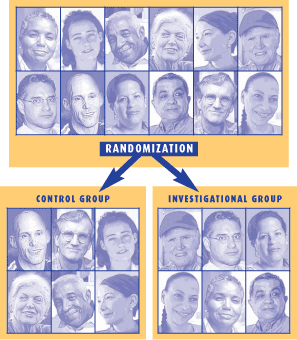Randomization
Randomization is a process used in some clinical trials to prevent bias. Bias occurs when a trial's results are affected by human choices or other factors not related to the treatments being tested. Randomization helps ensure that unknown factors do not affect trial results.
 |
| In a randomized clinical trial, you will be assigned by chance to either a control group or an investigational group. |
Randomization is used in all phase III and some phase II trials. These trials are called randomized clinical trials. If you participate in such a trial, you will be assigned by chance to either an investigational group or a control group. Your assignment will be determined with a computer program or table of random numbers.
- If you are assigned to the control group, you will get the most widely accepted treatment (standard treatment) for your cancer.
- If you are assigned to the investigational group, you will get the new treatment being tested.
Comparing these groups to each other often clearly shows which treatment is more effective or has fewer side effects. If you are thinking about joining a randomized clinical trial, you need to understand that there is an equal chance you will be assigned to either group. Neither you nor the doctor chooses the group you will be in.
| Will I get a placebo? A placebo is designed to look like the medicine being tested, but it is not active. Placebos are almost never used in cancer treatment trials. In some cases, a study may compare standard treatment plus a new treatment, to standard treatment plus a placebo. You will be told if the study uses a placebo. |

